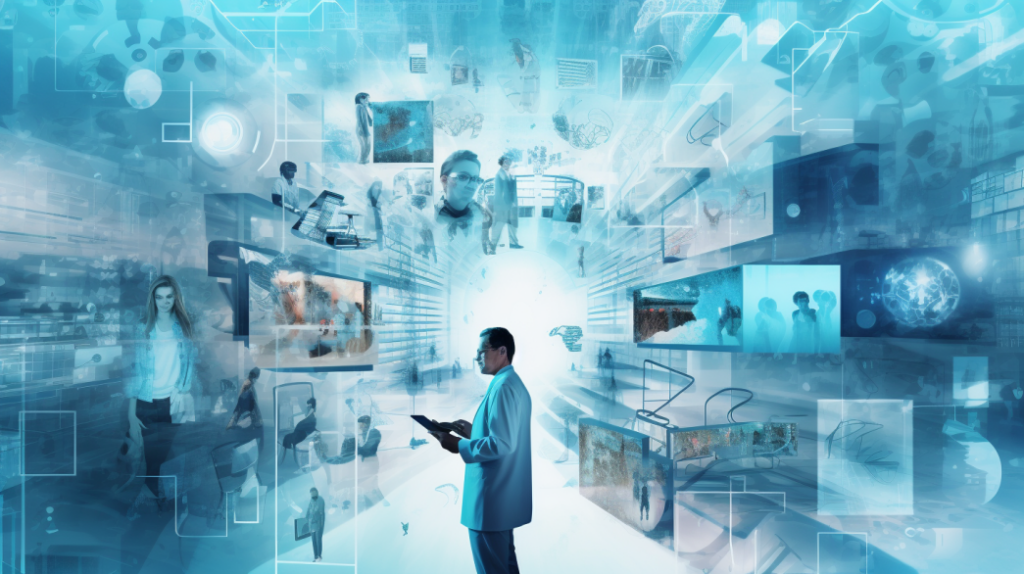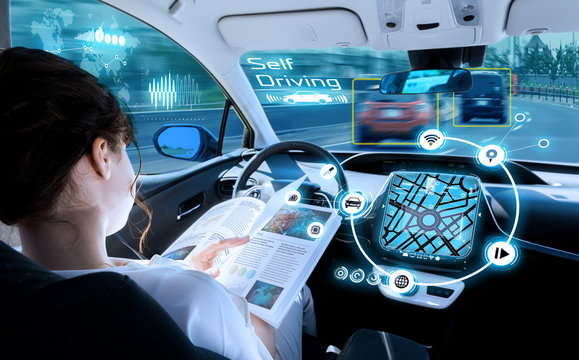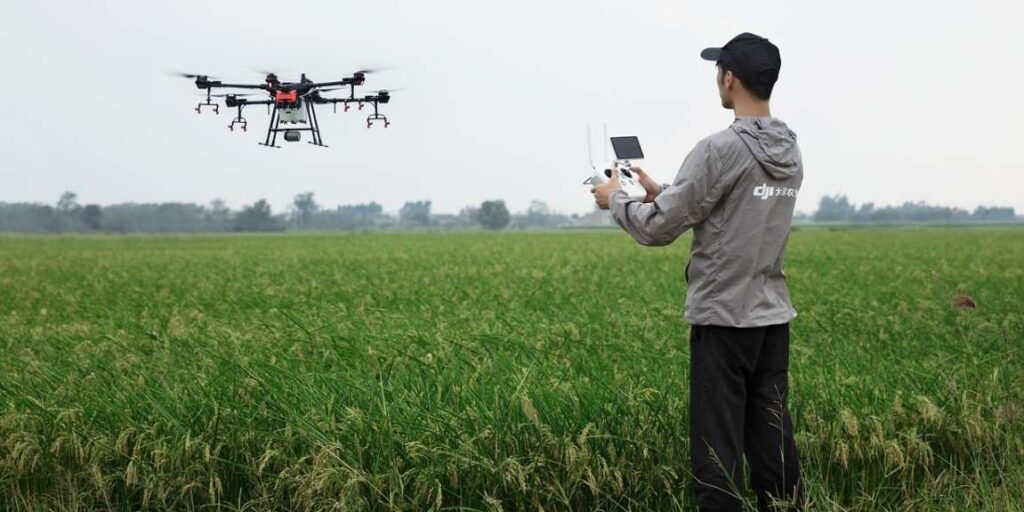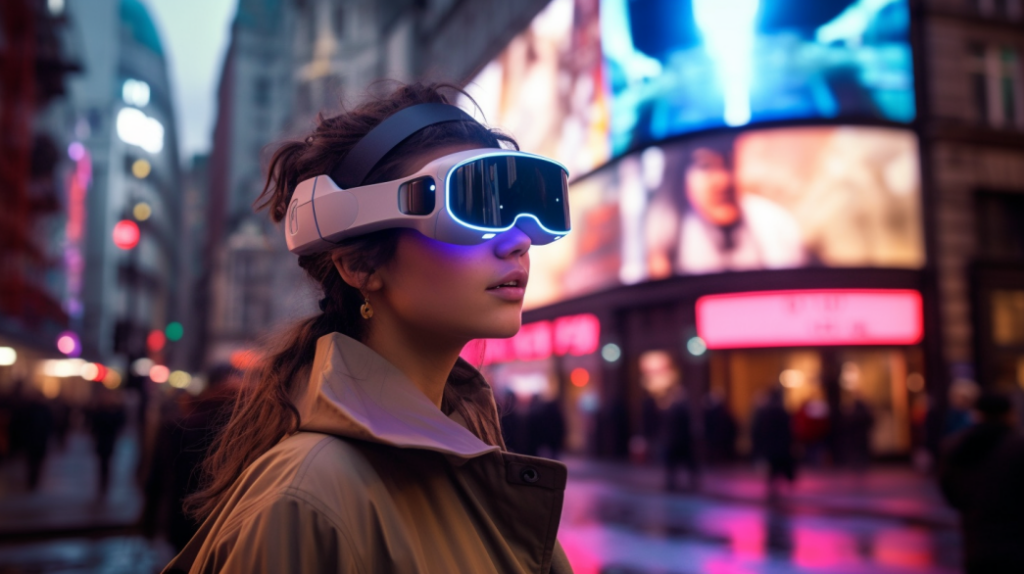Artificial Intelligence (AI) has become an integral part of our modern world, with its applications spanning across numerous industries. From simplifying online shopping to enhancing healthcare diagnostics, AI is making its mark across various sectors. Get ready to witness the incredible power of Artificial Intelligence. In this blog, we will explore fascinating diverse, and impactful applications of AI, Join us on this exciting journey of its transformative power and highlighting its significance in various sector
Let’s Look at the important applications of AI
Applications of AI in Healthcare

- Medical Diagnostics
AI algorithms analyze medical images, such as X-rays and MRI scans, to assist in diagnosing diseases and identifying abnormalities. This helps healthcare professionals make more accurate and timely diagnoses. AI-powered medical image analysis systems can analyze medical images with an accuracy rate of 96.7% for detecting breast cancer.
- Disease prediction
AI models analyze patient data and medical records to identify patterns and risk factors for the early prediction of diseases. This enables proactive interventions and preventive measures.
- Drug discovery
AI is used to accelerate the drug discovery process by analyzing vast amounts of data, predicting drug efficacy, and identifying potential drug candidates. This helps researchers in developing new and more effective treatments.
- Personalized medicine
AI algorithms analyze patient data, genetic information, and medical records to provide tailored treatment plans and medication recommendations. This enables personalized healthcare approaches based on individual characteristics.
- Electronic health records
AI-powered systems help manage and analyze electronic health records, enabling efficient data retrieval, decision support, and personalized patient care. This enhances patient outcomes and streamlines healthcare operations.
You may also like to read : The role of AI in healthcare
Applications of AI in Finance
- Fraud detection
AI algorithms analyze transactional data to detect patterns indicative of fraudulent activities, helping financial institutions identify and prevent fraud. This improves security and reduces financial losses. AI-powered fraud detection systems can reduce false positives by up to 50%, improving accuracy in identifying fraudulent transactions.
- Algorithmic trading
AI algorithms make automated trading decisions by analyzing market data, identifying trends, and executing trades at high speed. This improves trading efficiency and can lead to better investment returns.
- Risk assessment
AI models analyze historical data and market trends to assess the risks associated with financial investments, loans, and insurance policies. This helps in making informed decisions and managing risk effectively.
- Customer service chatbots
AI-powered chatbots assist customers with inquiries, provide support, and guide them through financial processes. This improves customer service and enhances the overall customer experience.
- Financial forecasting
AI models analyze historical financial data, market trends, and economic indicators to predict future financial outcomes and trends. This aids in decision-making, resource allocation, and strategic planning.
Applications of AI in retail and E-commerce
- Personalized product recommendations
AI algorithms analyze customer behavior, purchase history, and preferences to provide personalized product recommendations, enhancing the shopping experience. This increases customer engagement and drives sales.Personalized product recommendations powered by AI algorithms can increase conversion rates by 5% to 15%.
- Demand forecasting
AI models analyze historical sales data, market trends, and external factors to predict future demand and optimize inventory management. This reduces inventory costs and ensures products are available when needed.
- Chatbots for customer support
AI-powered chatbots interact with customers, answering inquiries, providing product information, and assisting with order tracking. This improves customer service efficiency and reduces response times.
- Price optimization
AI algorithms analyze market dynamics, competitor pricing, and customer behavior to optimize product pricing for maximum profitability. This helps businesses remain competitive and maximize revenue.
- Visual search and AR shopping experiences
AI-powered visual recognition technology enables customers to search and shop for products using images, and AR enhances the shopping experience by allowing virtual try-ons and visualizations. This improves product discovery and enhances customer engagement.
Applications of AI in manufacturing and industrial automation
- Predictive maintenance
AI models analyze sensor data and historical maintenance records to predict equipment failures and schedule maintenance proactively, reducing downtime. This improves operational efficiency and reduces maintenance costs.
- Quality control
AI-powered vision systems inspect and analyze product quality in real-time, identifying defects and anomalies to maintain high-quality standards. This reduces product recalls and ensures customer satisfaction.
- Supply chain optimization
AI algorithms optimize the supply chain by analyzing data related to demand, inventory levels, production capacity, and logistics to ensure efficient operations and minimize costs. This improves supply chain efficiency and customer service.
- Robotics and automation

AI-driven robots and automated systems perform tasks such as assembly, packaging, and material handling with precision and efficiency. This increases productivity, reduces errors, and lowers labor costs.
- Energy efficiency
AI systems monitor and optimize energy consumption in manufacturing processes, identifying opportunities for energy savings and sustainability. This reduces energy costs and environmental impact.
Applications of AI in transportation and logistics
- Autonomous vehicles

AI technologies power self-driving cars and trucks, enabling safer and more efficient transportation with reduced human intervention. This improves road safety, reduces congestion, and enhances logistics efficiency.
- Route optimization
AI algorithms analyze traffic patterns, road conditions, and real-time data to optimize routes and minimize travel time, fuel consumption, and costs. This improves delivery efficiency and reduces transportation expenses.
- Fleet management
AI systems monitor and manage vehicle fleets, optimizing maintenance schedules, tracking fuel consumption, and improving overall fleet efficiency. This reduces operational costs and enhances fleet performance.
- Demand forecasting
AI models analyze historical data and external factors to predict transportation and logistics demand, helping companies optimize resource allocation. This improves resource planning and enables better customer service.
- Last-mile delivery and drone logistics
AI algorithms optimize last-mile delivery routes and enable drone-based delivery systems for faster and more efficient delivery operations. This improves delivery speed, reduces costs, and expands delivery capabilities.
Applications of AI in education

- Personalized learning
AI-powered educational platforms provide personalized learning experiences, adapting content and pace to individual student needs and learning styles. This enhances student engagement and improves learning outcomes.Personalized learning powered by AI can improve student performance by up to 30%.
- Intelligent tutoring systems
AI-driven tutoring systems interact with students, providing customized instruction, feedback, and adaptive learning paths. This helps students grasp concepts more effectively and boosts academic performance.
- Automated grading
AI algorithms assess and grade student assignments, quizzes, and exams, reducing the time spent on manual grading and providing prompt feedback. This streamlines the grading process and enhances efficiency.
- Educational chatbots
AI-powered chatbots assist students with inquiries, provide study resources, and guide them through educational processes. This enhances access to information and support for students.
- Learning analytics
AI systems analyze student performance data, learning patterns, and engagement levels to provide insights for personalized interventions and improvements in educational programs. This facilitates data-driven decision-making and instructional design.
Read more: Benefits of AI in education: AI-Powered learning
AI applications in agriculture
- Crop monitoring
AI technologies, such as remote sensing and drones, analyze data from satellites and sensors to monitor crop health, growth, and yield prediction. This enables precision farming practices and maximizes crop productivity.
- Precision farming

AI algorithms analyze data from soil sensors, weather data, and historical crop performance to optimize irrigation, fertilization, and pesticide application. This improves resource efficiency and reduces environmental impact.Precision farming techniques driven by AI can reduce water usage by up to 50% and increase crop yields by 20%
- Pest detection
AI-powered image recognition systems identify pests, diseases, and weeds in crops, enabling targeted and timely interventions. This enhances crop protection and reduces yield losses.
- Livestock monitoring
AI systems monitor the health, behavior, and productivity of livestock, providing early detection of diseases, optimizing feeding strategies, and improving animal welfare. This enhances livestock management and productivity.
- Farm management systems
AI platforms integrate and analyze data from various sources, such as weather data, equipment sensors, and market prices, to provide farmers with insights for decision-making, resource optimization, and yield improvement. This improves farm efficiency and profitability
Applications of AI in Cybersecurity

- Threat detection
AI algorithms analyze network traffic, user behavior, and system logs to detect and mitigate potential cyber threats, such as malware, intrusion attempts, and anomalous activities. This enhances cybersecurity and protects against cyberattacks.AI-powered threat detection systems can reduce the time to detect cyber threats by up to 70%.
- Malware analysis
AI-powered systems analyze code patterns, behaviors, and network signatures to identify and classify malware, aiding in quick detection and response. This helps protect systems and data from malicious software.
- User behavior analytics
AI models analyze user activity patterns and behavior data to detect anomalies and identify potential security breaches or insider threats. This strengthens security measures and helps prevent data breaches.
- Network security
AI systems monitor and analyze network traffic, identifying vulnerabilities and enhancing security protocols to protect against cyberattacks. This strengthens network defenses and safeguards critical systems and data.
- Security incident response
AI technologies automate and accelerate incident response processes, aiding in threat containment, incident investigation, and recovery procedures. This helps organizations respond effectively to security incidents and minimize damage.
The global cybersecurity market is expected to reach $366.1 billion by 2028.
Applications of AI in customer service
- AI Chatbots and virtual assistants for customer queries
AI-powered chatbots interact with customers, providing instant responses to inquiries, troubleshooting assistance, and information about products and services. This improves customer service availability and responsiveness.
- Natural language processing for sentiment analysis
AI algorithms analyze customer feedback, social media posts, and other text data to gauge sentiment, identify customer needs, and enhance customer experiences. This helps organizations understand customer sentiment and tailor their offerings accordingly.
- Voice recognition and speech-to-text translation
AI technologies enable voice-based customer interactions, transcribe customer conversations, and facilitate automated voice response systems. This improves customer convenience and enhances self-service capabilities.
- Customer behavior analysis and personalized recommendations
AI systems analyze customer behavior, purchase history, and preferences to provide personalized product recommendations and tailored marketing offers. This enhances customer engagement and drives customer satisfaction.
- Social media listening and customer feedback analysis
AI tools monitor social media platforms, extract relevant information, and analyze customer sentiment and feedback to identify trends and improve products and services. This helps organizations proactively address customer concerns and improve their offerings.
Applications of AI in Gaming and Entertainment
- Character animation and behavior modeling
AI algorithms create realistic and dynamic character animations, mimicking human-like movements and behaviors. This enhances the visual appeal and immersive experience in gaming and entertainment.
- Intelligent game opponents and adaptive difficulty levels
AI models simulate intelligent game opponents, adjusting difficulty levels based on player skills and behaviors to provide challenging and engaging gameplay experiences. This enhances player satisfaction and gameplay enjoyment.
- Virtual reality (VR) and augmented reality (AR) experiences

AI technologies enhance VR and AR experiences by providing real-time rendering, object recognition, and immersive interactions. This improves the realism and interactivity of virtual and augmented environments.The VR and AR market is estimated to reach $72.8 billion by 2024.
- Procedural content generation and game testing
AI algorithms generate game content, such as levels, maps, and quests, and automate game testing to ensure quality and balance. This enhances game development efficiency and reduces manual content creation efforts.
- Player behavior analysis and personalized game recommendations
AI systems analyze player behavior, preferences, and interactions to provide personalized game recommendations and targeted in-game experiences. This enhances player engagement, retention, and satisfaction.
AI applications in Law and legal services
- Legal Research and Document Analysis
AI systems analyze legal documents for efficient research and decision-making. AI-powered legal research platforms can provide results 27% faster than traditional methods.
- Contract Review and Analysis
AI algorithms identify clauses and risks, improving contract management.
- Predictive Analytics for Case Outcomes
AI models predict case outcomes and support legal strategy.
- E-Discovery and Document Management
AI automates document analysis for efficient discovery processes.
- Compliance Monitoring and Regulatory Intelligence
AI tools ensure adherence to legal frameworks and monitor regulatory changes.
Applications of AI in Marketing and Advertising
- Targeted advertising and personalized campaigns
AI technologies analyze customer data, behavior, and preferences to create targeted advertising campaigns and deliver personalized marketing messages. This improves marketing effectiveness and customer engagement. Personalized advertising campaigns can increase customer engagement by up to 74%
- Customer segmentation and profiling
AI algorithms segment customers based on demographics, behavior, and preferences, enabling more targeted and effective marketing strategies. This enhances customer understanding and enables tailored marketing approaches.
- Social media sentiment analysis and trend detection
AI tools analyze social media data to gauge sentiment, identify trends, and monitor brand reputation, aiding in social media marketing and brand management. This helps organizations understand customer perceptions and respond appropriately.
- Marketing automation and campaign optimization
AI-powered systems automate marketing processes, such as email campaigns, lead scoring, and customer journey mapping, to enhance efficiency and campaign effectiveness. This streamlines marketing operations and improves campaign performance.
- Predictive analytics for customer behavior and preferences
AI models analyze customer data and historical patterns to predict customer behavior, identify upselling opportunities, and optimize marketing strategies. This enables targeted marketing efforts and improves customer satisfaction.
AI applications in environmental conservation
- Wildlife monitoring and poaching detection
AI technologies, such as image recognition and sensors, monitor wildlife habitats, identify species, and detect illegal activities like poaching. This aids in wildlife conservation efforts and protects endangered species. AI-enabled wildlife monitoring systems can detect and prevent poaching incidents with an accuracy rate of 90%.
- Climate modeling and prediction
AI algorithms analyze climate data, historical patterns, and environmental factors to model climate changes, predict weather events, and support climate research. This enhances climate change understanding and helps in developing mitigation strategies.
- Environmental impact assessment and mitigation strategies
AI systems analyze environmental data and models to assess the impact of human activities, support environmental impact assessments, and propose mitigation strategies. This aids in sustainable development and environmental planning.
- Air and water quality monitoring and analysis
AI-powered systems analyze data from air and water quality sensors, detect pollutants, and provide real-time monitoring and analysis for environmental monitoring agencies. This helps in maintaining and improving air and water quality standards.
- Natural disaster prediction and response planning
AI models analyze historical disaster data, weather patterns, and geospatial information to predict and simulate natural disasters, aiding in disaster preparedness and response planning. This helps in minimizing the impact of natural disasters and enhancing response capabilities.
The global market for environmental monitoring solutions is projected to reach $20.5 billion by 2026
Applications of AI in sports analytics

- Player Performance Analysis and Prediction
AI algorithms analyze player data, match statistics, and physical attributes to assess player performance, predict outcomes, and provide insights for training and coaching.
- Game strategy optimization and simulation
AI models simulate game scenarios, analyze game strategies, and provide recommendations to optimize team performance and enhance game strategies.
- Injury prevention and rehabilitation programs
AI systems analyze player health data, movement patterns, and injury history to identify injury risks, optimize training programs, and aid in injury prevention and rehabilitation.
- Fan engagement and personalized experiences
AI technologies analyze fan data and preferences to provide personalized content, promotions, and experiences to enhance fan engagement.
- Sports broadcasting and real-time analytic
AI-powered systems analyze live sports data, track player movements, and provide real-time analytics and visualizations for sports broadcasters and analysts.
AI-powered player performance analysis can provide coaches with insights to improve team performance by up to 20%.
Read more: AI in Sports: Revolutionizing Performance and Analytics
AI in Supply Chain and Logistics
- Inventory Optimization and Demand Forecasting
AI algorithms optimize inventory levels and accurately forecast demand.
- Route Optimization and Delivery Time Prediction
AI models optimize delivery routes and predict delivery times.
- Warehouse Automation and Robotics
AI-enabled robotics automate warehouse operations.
- Supplier Management and Procurement Analytics
AI systems optimize supplier selection and procurement strategies.
- Supply Chain Risk Management and Visibility
AI-powered systems monitor and mitigate supply chain risks.
The global market for AI in supply chain management is expected to reach $10.1 billion by 2027.
AI’s applications are diverse and transformative, spanning healthcare diagnostics, autonomous vehicles, fraud detection, and personalized marketing. With AI, we diagnose and treat diseases more effectively, navigate roads autonomously, prevent financial losses through fraud detection, and deliver tailored marketing experiences. As natural language processing and machine learning advance, AI’s impact will only grow, reshaping industries and enhancing our lives in profound ways. Embracing AI’s power is crucial for unlocking its potential and driving innovation forward.
You may also like to read: The Future of AI and its impact on society
